Home > News > Specials
The Rediff Special/Shobha Warrier
April 21, 2005
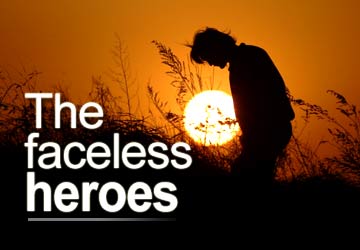
A hero's tale always excites people. So, it does not surprise me when people react passionately to a hero's story.
I recently wrote about a fighter called Siddharth, and it surprised him and his family to see the way readers reacted to his story. 'Me, a hero?' Siddharth asked with disbelief and amusement.
But one reader's response took Siddharth by surprise. It was a call he received from Rashtrapati Bhavan [Images] asking for his address. Then came a call from the President's personal assistant. Soon the call was transferred to President A P J Abdul Kalam. Siddharth could not believe his ears when the President appreciated what he has achieved. The President also expressed his desire to meet Siddharth when he came to Chennai next. The call was followed by a letter of appreciation signed by the President.
Like Siddharth, there are many, many heroes, most of them unsung, all around us. I had the good fortune to meet some real heroes, talk to them and write about them.
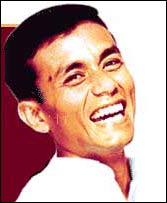 One person whom I cannot forget is Ashok Pillai. When the very word HIV positive was anathema, when the word AIDS was not uttered in public, this young man started a network for HIV positive people, and came out openly about his status. I went to interview him after he posed for an emotionally stirring poster for the Positive Network as himself, an HIV positive person who loved everything about life.
One person whom I cannot forget is Ashok Pillai. When the very word HIV positive was anathema, when the word AIDS was not uttered in public, this young man started a network for HIV positive people, and came out openly about his status. I went to interview him after he posed for an emotionally stirring poster for the Positive Network as himself, an HIV positive person who loved everything about life.
What a person he was! So full of energy and warmth! Not once did he complain or moan about what had happened to him. He was like any other young man; he played musical instruments, sang old Hindi songs, played games and wrote too. He was a real positive person. This happened years ago, and he is not alive anymore, but I still cannot forget him and that wonderful smile of his.
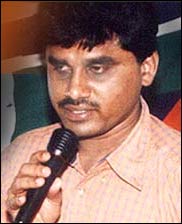 When I first met Murali, the man in charge of the Cheshire Home in Chennai , I did not even know he was blind. I spoke with him for quite some time not knowing he was not a normally abled person. He sat behind a desk and talked to me like any other person. He took out some files from a nearby cabinet and showed them to me. Only when I asked him a question about a picture did he say, "I can't see." That is how Murali behaves, like any other normal person.
When I first met Murali, the man in charge of the Cheshire Home in Chennai , I did not even know he was blind. I spoke with him for quite some time not knowing he was not a normally abled person. He sat behind a desk and talked to me like any other person. He took out some files from a nearby cabinet and showed them to me. Only when I asked him a question about a picture did he say, "I can't see." That is how Murali behaves, like any other normal person.
He was passionate about one thing, and that was working for the underprivileged. Many dissuaded him when he decided to become a social worker but he went ahead. He didn't give a damn when people said, 'You yourself need help, then what kind of social work are you going to do?'
He travels to unknown villages, that too all alone, and works for the poor. He catches buses, walks and works with the needy without asking for help from anyone. He is a real hero, leading a more heroic life than the heroes of the books I had read as a child.
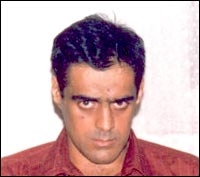 Another person I can never forget is Krishna Narayan, a severely autistic young man with whom I did not have any interaction at all. His is a very intelligent mind trapped in an unwilling body. It was his mother who told me his story as he couldn't talk: about how he overcame his disability, rather how she helped him overcome his disability and express his innermost feelings. After 20 long years, he learnt to communicate with the outside world, -- his mother and father too -- through his writing.
Another person I can never forget is Krishna Narayan, a severely autistic young man with whom I did not have any interaction at all. His is a very intelligent mind trapped in an unwilling body. It was his mother who told me his story as he couldn't talk: about how he overcame his disability, rather how she helped him overcome his disability and express his innermost feelings. After 20 long years, he learnt to communicate with the outside world, -- his mother and father too -- through his writing.
As I went through the book, I understood who Krishna was and saw the mind of an autistic child and also a young man. I did not stir from the place till I finished the book. Tears rolled down my cheeks as I turned the pages. The book was possible only because of his mother. I would say I have not met greater heroes than Krishna and his mother in my life.
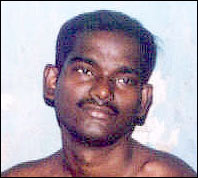 Now I want to tell you a different tale. This man was not a hero. In fact, when I met Ganapathi -- I was literally dragged to the house by his mother as I was waiting for Dayanidhi Maran to arrive for an election meeting last year -- he was almost dead, a man who could not even raise his head or breathe. He could not lie down flat as that made him breathless. He was curled up in bed with his head kept on a stool. It was a pathetic sight.
Now I want to tell you a different tale. This man was not a hero. In fact, when I met Ganapathi -- I was literally dragged to the house by his mother as I was waiting for Dayanidhi Maran to arrive for an election meeting last year -- he was almost dead, a man who could not even raise his head or breathe. He could not lie down flat as that made him breathless. He was curled up in bed with his head kept on a stool. It was a pathetic sight.
Then, his mother told me what he was suffering from. Both his kidneys had stopped functioning, and he had not undergone dialysis for a month as his family had no money. His three small children had stopped going to school. His family had spent every single penny they had on his treatment. They borrowed heavily too. "All of us are going to commit suicide. There is no other way out for us." she said.
When I wrote about Ganapathi's plight, kind-hearted rediff.com readers from all over the world -- hundreds of them -- rushed forward to help him and his family.
A gentleman from Canada [Images] who read Ganapathi's plight called me and took down Ganapathi's address. When he came down to Chennai a week later, he went to the children's school, paid their fees, paid for their books and uniform, and went away silently. He wanted to remain anonymous. Ganapthai's wife Ramani told me, "He did not meet us or tell us his name. We wanted to fall at his feet and thank him."
Ganapathi's children went back to school and completed the academic year because of that stranger.
Today Ganapathi is alive and able to move around inside his house only because of the hundreds of anonymous people who helped him by sending money. He still survives on two dialyses a week. Though they have identified a donor, because of an infection in his liver, Ganapathi has not yet been operated upon.
"If we are alive, if my husband is walking inside the house and if my children went to school," Ramani told me, "it is because of many, many good people. I don't know how to thank all of them. I see God in all of them."
Actually, they are the faceless heroes.
Headline Photograph: Cancan Chu/GettyImages and Copy Photograph: Sreeram Selvaraj
Design: Rahil Shaikh